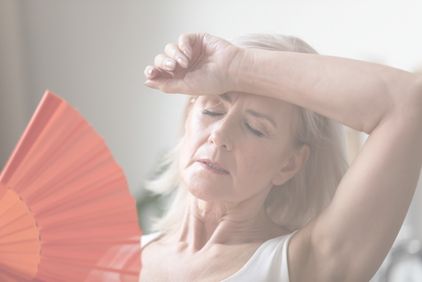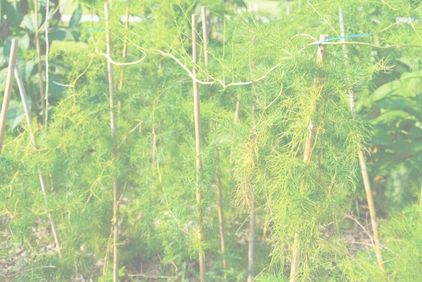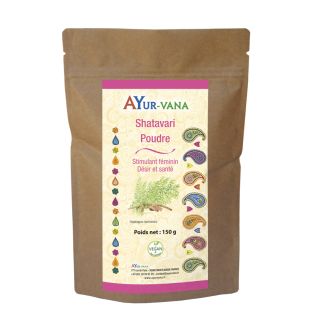Traditional Ayurvedic medicine pays particular attention to women's health, recognizing the need to treat female physiology in a unique way. Indeed, women undergo delicate transitions when their hormonal balance and overall health can be considerably disrupted, particularly during menopause.
Ayurveda offers powerful natural allies to gently guide women through this unbalanced phase, such as Shatavari.
Let's discover in this article the unique place of women in Ayurveda, how menopause is perceived in Ayurvedic medicine, and finally learn more about the many benefits of Shatavari.
Ayurveda: a caring approach to women's health

Born over 5000 years ago in India, Ayurveda conceptualizes the human body as a microcosm, where the five fundamental elements (earth, water, fire, air, ether) combine to form the three doshas: Vata, Pitta and Kapha. Each individual possesses a unique combination of these doshas (Prakiti), which evolves over time and through experience (Vikriti). This is particularly true of women, whose doshas fluctuate naturally throughout their lives, influenced by menstrual cycles, pregnancy and menopause.
For Ayurvedic medicine, women are special beings, requiring a highly personalized approach to maintain their physical, mental and emotional balance.
Recommendations for the use of Ayurvedic herbs are based on the different phases of a woman's life, offering attentive, specific care adapted to the particular stages she may be going through.
Menopause is part of one of these cycles, and requires a very specific understanding and approach.
Ayurveda and menopause

A period of life fraught with all kinds of disturbances, menopause can be approached with greater serenity thanks to Ayurveda. At menopause, an imbalance in the doshas leads to more or less pronounced symptoms in women, depending on their basic constitution and lifestyle.
Here's an overview :
- Too much Pitta can lead to mood swings, irritability, night sweats and excessive perspiration;
- Too much Kapha can lead to joint problems, feelings of heaviness, lack of motivation and even a tendency to depression;
- Too much Vata can lead to anxiety and concentration problems, constipation and back pain.
Ayurveda offers a personalized approach to relieving the discomforts of menopause, focusing on rebalancing the doshas, in particular Vata and Pitta.
Hot flushes, often associated with this period, can be alleviated through regular dieting and the consumption of vegetable juices or soups, offering a welcome cooling effect.
Joint discomfort, common during menopause, can be alleviated by including oilseeds in the diet, providing anti-inflammatory benefits.
Ayurveda also recommends the practice of yoga and breathing exercises for optimal management of anxiety, a component often exacerbated in this transition phase. Oil massages, an ancient Ayurvedic practice, not only soothe dry skin, but also contribute to effective drainage of the body, promoting overall well-being.
By adopting these Ayurvedic adjustments, women can take a natural approach to menopause, finding both physical and emotional relief at this stage of their lives.
Shatavari, an age-old plant, is also highly valued in Ayurveda and among Indian women for its many benefits to women's health, and is regularly recommended by Ayurvedic practitioners to gently guide women through this transition. In fact, Shatavari is nicknamed "the women's plant".
The benefits of the Shatavari plant during menopause

Shatavari, also known by its scientific name Asparagus racemosus, is a plant native to India that has been revered for centuries in Ayurvedic medicine for its multiple benefits, particularly during menopause. Shatavari root is prized for its regulating action on hormonal fluctuations, offering significant support to women going through this transitional phase.
During menopause, many hormonal changes can lead to symptoms such as hot flushes, night sweats, intimate dryness, digestive disorders, as well as disturbances in mood and libido. Thanks to its high phyto-oestrogen content, organic Shatavari acts as a natural hormone modulator, helping to alleviate these symptoms. In addition, it promotes natural lubrication and relieves intimate dryness, improving the physical well-being of menopausal women.
In addition to its impact on physical symptoms, Shatavari also plays a role in managing mood disorders common during menopause. By acting as an adaptogen, it helps to stabilize emotional fluctuations, offering significant support during this period.
The phytoestrogens present in organic Shatavari are, in fact, plant compounds that mimic the action of natural estrogens in the body. In this way, they help regulate hormone levels, helping to reduce numerous disorders such as the intensity of hot flushes and night sweats.
Women, Ayurveda and shatavari root
Women thus occupy an important place in Ayurveda, where each stage of their journey is honored by specific treatments tailored to each individual. Menopause, often perceived as a tumultuous phase, finds an attentive and personalized approach in Ayurvedic medicine.
At the heart of this approach is Shatavari, a plant that embodies the delicacy and power of nature. Its benefits for women's health, particularly during the menopause, make it an invaluable ally. By regulating hormones and soothing physical and emotional symptoms, Shatavari offers comfort and balance, enabling women to embrace this natural transition with greater serenity.








